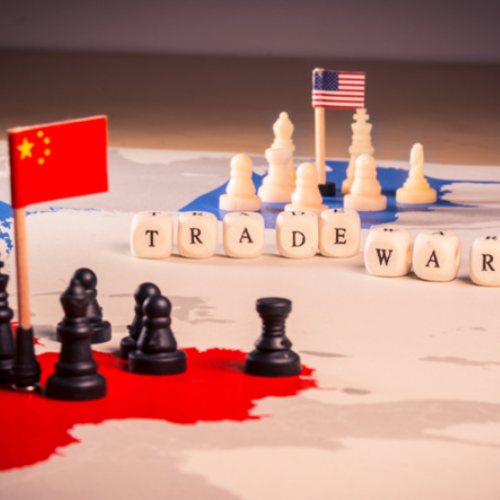The ongoing trade fight between the United States and China just got a lot more intense. China has now raised its tariff on goods coming from the U.S. to a huge 84%. A tariff is like a tax that one country puts on goods from another country. This move is seen as a countermeasure, which means it’s China’s way of hitting back after the U.S. raised its own tariffs on Chinese goods.
Just last week, China had already announced a 34% tariff on all imports from the U.S. But now, they’ve gone even further. This new 84% tariff affects a wide range of U.S. products and is expected to make them much more expensive in China. That could hurt American businesses that sell goods to Chinese customers.
The fight didn’t start with China. The United States raised its tariffs on Chinese exports to a whopping 104% earlier this week. This big move was meant to put pressure on China during ongoing disagreements over trade policies.
Trump Slaps 104% Tariffs on China in Big Trade Fight
Markets React with Panic
As soon as China’s announcement came out, U.S. stock markets took a big hit. Stock index futures are a way of guessing how the stock market will move when it opens. These futures dropped fast and hard.
At 7:08 a.m. Eastern Time on Wednesday, the Dow Jones E-mini futures were down 709 points, which is a drop of 1.87%. The S&P 500 E-mini futures went down by 86.5 points, or 1.72%. The Nasdaq 100 E-mini futures also slid by 250.75 points, a fall of 1.45%. These are big drops and show that investors are very worried.
Why are markets reacting this way? Because when two of the world’s largest economies are in a fight, it causes a lot of uncertainty. Companies might make less money, global trade might slow down, and that can affect everything from jobs to prices on everyday items.
The high tariffs on both sides are likely to make products more expensive, not just in China and the U.S., but all over the world. And when prices go up, people tend to spend less, which can hurt businesses and economies.
China Takes the Fight to the WTO
China didn’t just raise tariffs. It also brought the issue to the World Trade Organization (WTO), the global group that helps countries solve trade problems. In a statement sent to the WTO and reported by news outlets, China said it was very concerned about the U.S.’s actions.
Trump Ties EU Tariff Relief to Bold 350 Billion Energy Deal
China accused the U.S. of breaking WTO rules and claimed that these actions were putting the whole global trading system at risk. “The situation has dangerously escalated,” China said. They also said that while they don’t want a trade war, they will do whatever it takes to protect their rights.
In their statement, China made it clear that they believe the U.S. is being reckless. They urged the WTO to look closely at what’s happening and report back on how these high tariffs are affecting the world. According to China, these so-called “reciprocal tariffs” don’t solve trade problems. Instead, they could hurt the U.S. itself by making things more expensive and slowing down the economy.
Trade fights like this can have big ripple effects. They can cause factories to close, prices to rise, and even lead to job losses. China warned that if things keep going this way, the whole system that keeps global trade running smoothly could be damaged.
This latest round of tariffs shows that the trade fight between China and the U.S. is far from over. Both sides are raising the stakes, and the impact is already being felt in the markets and across the global economy.


